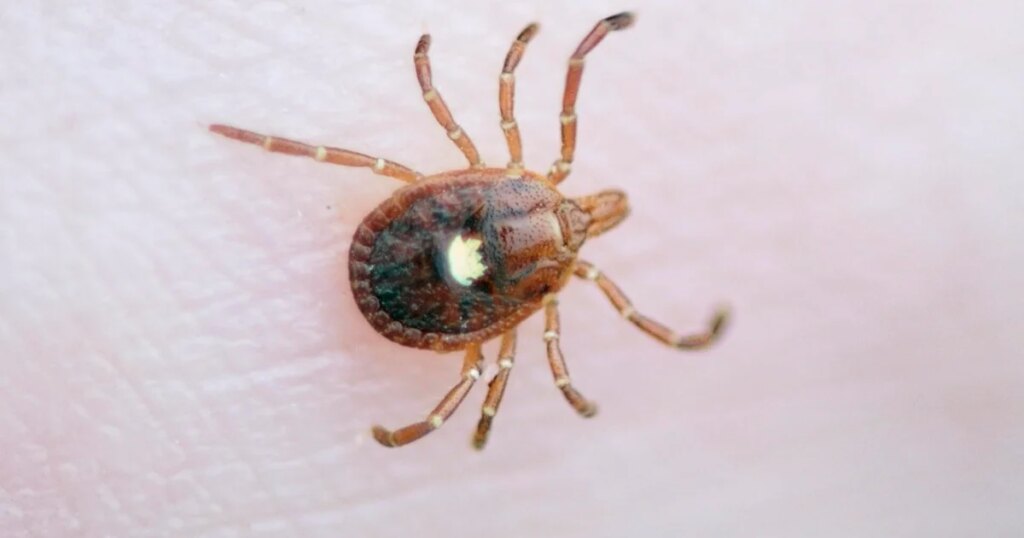In a groundbreaking case, a New Jersey man has been identified as the first person to reportedly die from an allergy linked to a tick bite, known as alpha-gal syndrome (AGS). The 47-year-old man passed away in September 2024, but researchers only recently established a connection between his death and this rare condition. Medical experts caution that the rise of Lone Star ticks in northern regions enhances the risk of individuals developing adverse reactions to certain foods, specifically red meat and dairy products.
| Article Subheadings |
|---|
| 1) Details of the Case |
| 2) Medical Investigation |
| 3) Rarity and Risks of AGS |
| 4) Prevention and Awareness |
| 5) Implications for Public Health |
Details of the Case
The tragic incident took place in the summer of 2024 when a New Jersey man went camping with his family. The camping trip included a dinner of beef steak following a day spent outdoors. Approximately four hours after the meal, the man began experiencing intense abdominal pain, diarrhea, and vomiting. His condition led him to express a grave concern, stating “I thought I was going to die,” although he opted not to seek medical help at that time.
About two weeks later, during a barbecue, he consumed a hamburger, and shortly after, he was found unconscious in the bathroom, surrounded by vomit. Despite immediate medical attention, he was declared dead at the hospital. The man’s name and specific camping location have not been disclosed to the public.
Medical Investigation
Initially, the man’s death was categorized as a “sudden unexplained death.” However, his wife sought a second opinion on the autopsy report from a friend in the medical field who suspected a possible link to AGS. Following this, the man’s blood was tested for antibodies to alpha-gal, a carbohydrate found in mammalian meat that can trigger allergic reactions in sensitized individuals.
The results confirmed that the man had indeed experienced a fatal allergic reaction consistent with anaphylaxis, triggered by alpha-gal. This unfortunate occurrence marks the first documented case of anaphylactic death related to AGS after several hours of consuming mammalian meat.
Rarity and Risks of AGS
Alpha-gal syndrome is an uncommon but increasingly recognized condition resulting from the bite of a Lone Star tick. This condition leads to a sensitivity to alpha-gal, potentially causing severe allergic reactions upon ingesting red meat products. Symptoms can include hives, abdominal pain, nausea, and significant breathing challenges, among others.
The Centers for Disease Control and Prevention (CDC) has reported a gradual increase in cases of AGS, notably in areas where Lone Star ticks are proliferating. Researchers highlight that although the risk of developing this syndrome is relatively low, the implications can be severe. Therefore, awareness and understanding of the symptoms are crucial for timely intervention.
Prevention and Awareness
Medical experts advocate for increased public education concerning AGS, especially given the surge in Lone Star tick populations in northern states like New York and New Jersey. The rise in tick bites, combined with the potential for serious allergic reactions to meat, necessitates proactive measures to protect public health.
Experts urge individuals, particularly those residing in tick-endemic areas, to adopt preventive strategies, including wearing protective clothing, applying insect repellents, and performing thorough tick checks after outdoor activities. Healthcare providers are also encouraged to inquire about recent tick exposure when patients present with unexplained abdominal pain after consuming red meat.
Implications for Public Health
This case underscores the urgent need for public health initiatives aimed at raising awareness about AGS and its potential implications. Experts assert that while fatalities from AGS may be rare, they are not impossible, and the potential for severe reactions should not be understated.
In addition, it is vital for healthcare practitioners to remain informed about the evolution of tick-borne conditions in order to provide accurate advice and care to affected patients. By enhancing public knowledge around AGS, medical professionals hope to prevent similar incidents in the future.
| No. | Key Points |
|---|---|
| 1 | A New Jersey man is the first known fatality linked to alpha-gal syndrome, triggered by a Lone Star tick bite. |
| 2 | The individual experienced severe symptoms hours after consuming red meat, leading to his death. |
| 3 | Medical investigation revealed an allergic reaction to alpha-gal as the cause of death. |
| 4 | Public health experts emphasize the importance of awareness to prevent similar cases. |
| 5 | Preventive measures include tick avoidance and medical consultation for concerning symptoms. |
Summary
The case of the New Jersey man who died from alpha-gal syndrome highlights the critical need for public awareness about tick-borne illnesses and their potential consequences. While such deaths are rare, the increasing prevalence of Lone Star ticks in northern states raises alarms for both patients and healthcare providers. Enhanced knowledge, preventive actions, and timely medical responses can ultimately save lives and mitigate the risks associated with this rare syndrome.
Frequently Asked Questions
Question: What is alpha-gal syndrome?
Alpha-gal syndrome is an allergy to alpha-gal, a carbohydrate found in red meat and dairy products, typically triggered by a bite from the Lone Star tick.
Question: How can one prevent infections related to Lone Star ticks?
Preventative measures include using insect repellent, wearing protective clothing, checking for ticks after outdoor activities, and understanding the symptoms of tick-borne diseases.
Question: What should I do if I experience symptoms after consuming red meat?
If you develop symptoms like abdominal pain, hives, or difficulty breathing after eating red meat, seek medical attention promptly and inform your healthcare provider about any recent tick bites.
